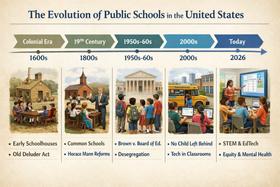Many high schools have traditionally included rituals like a benediction or invocation at their graduation ceremonies. While these terms might refer to a variety of things, many believe the words themselves invoke a religious ritual – one that is not allowed to be introduced or endorsed by public schools. The question of prayer during a graduation ceremony has also been a point of controversy for many years at high schools across the country. This year has been no exception, with a Texas public high school graduation coming to the forefront in the latest battle. We will take a look at the issue of prayer during graduation ceremonies, including why some believe that the practice is in direct violation of the constitutional separation of church and state.
What Happened in Texas?
Medina Valley High School in Castroville, Texas, has had a long tradition of including an invocation at the beginning of their graduation ceremonies and a benediction at the end. This year, a student at the school, along with his parents, took issue with the use of terms in the graduation ceremony that some could construe as religious. The family took their case to a district judge, who ruled that Medina was violating the constitution in using such terminology and ordered them to remove the invocation and benediction from the graduation program.
Ayesha Khan, the lawyer for the family, told Reuters, "We think that the district has been flouting the law for decades. We're glad that the court is going to put an end to it." Khan explained that the student who brought the lawsuit was an agnostic who has been alienated from his school for religious reasons in the past as well. Khan told WOAI News, "He was in the school band his freshman and sophomore years, and he was required to stand during prayer. So he chose not to be part of the band for his junior and senior years in order to avoid having to participate as a condition of being in a public school band."
This video offers an overview of Medina Valley High School.
The school district does not believe it has done anything wrong in terms of keeping church and state separate in their schools. Although they agreed to remove the invocation and benediction from the high school graduation ceremony at Medina, Chris Martinez, assistant superintendent of the Medina Valley Independent School District, told Reuters, "Our entire school system is set up on following the rules and we are going to do that. But this is one parent's opinion of what we are doing. We don't believe we have done anything wrong."
The judge who made the ruling was District Judge Fred Biery. Biery ruled that students who are speaking at the ceremony can still talk about their faith or refer to God on a personal level. However, they may not use the terms, "amen" or "God bless you" and they may not ask the audience to join them in prayer by standing or bowing their heads.
Those in Favor
There are many who agree that schools often go too far in bringing religion into the classroom. According to a recent op-ed piece at religiondispatches.org, the 1992 ruling Lee vs. Weisman made it illegal for public high schools to schedule a prayer during a graduation ceremony. The post referred to another case that took place this year in Louisiana, where a student complained about the unconstitutionality of prayer at his school. The prayer was dropped in favor of a moment of silence, but according to the post, the local community was upset by the action.
This video illustrates the debate on the issue of prayer in public schools.
The author of this post concedes that although steps have been taken to remove all forms of religion from public school ceremonies like graduations, they have not been removed entirely. Students still manage to bring their faith into their talks, since the courts have been fairly divided on the issue of individuals talking about their faith in front of an audience, without the school's endorsement.
Those Opposed
The issue with students offering prayer at ceremonies of their own accord involves the First Amendment protection of free speech. When students are told they cannot make reference to their faith or their God, their First Amendment rights are clearly violated. In an article at The News Star, a student at Bastrop High School, Lacie Mae Mattice, was told she could not mention anything religious in her speech at her graduation ceremony. According to the article, "they violated the law and Mattice's First Amendment rights."
The law referred to in the article states, "So long as the prayer is genuinely student-initiated…the speech is private and it is protected." The law also says, "When student speakers enter the…ceremony, they do not shed their constitutional rights to freedom of expression." While the school was right in removing the prayer from the official schedule for the ceremony, when they told Mattice what she could and couldn't say, that was when they overstepped their authority, according to the article.
This video further illustrates the school prayer issue.
Over the years, courts have reached conflicting conclusions regarding where a student's rights land with student-initiated prayer in schools. While the First Amendment does protect an individual's freedom of speech, the courts seem less sure how to handle those rights when they appear to be in violation of the separation of church and state. At this time, there does not seem to be any concrete solution to the controversy, and with emotions running high on both sides of the issue, this is certainly not to be the last graduation season that will be saddled with the question of whether to allow prayers of any kind at high school graduation ceremonies.
Questions? Contact us on Facebook. @publicschoolreview















